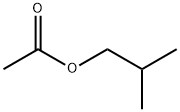A4998912
Isobutyl acetate , StandardforGC,>99.5%(GC) , 110-19-0
Synonym(s):
Acetic acid isobutyl ester;Isobutyl acetate
CAS NO.:110-19-0
Empirical Formula: C6H12O2
Molecular Weight: 116.16
MDL number: MFCD00008932
EINECS: 203-745-1
Update time: 2022-07-08
PRODUCT Properties
| Melting point: | -99 °C (lit.) |
| Boiling point: | 115-117 °C (lit.) |
| Density | 0.867 g/mL at 25 °C (lit.) |
| vapor density | >4 (vs air) |
| vapor pressure | 15 mm Hg ( 20 °C) |
| FEMA | 2175 | ISOBUTYL ACETATE |
| refractive index | n |
| Flash point: | 71 °F |
| storage temp. | Store below +30°C. |
| solubility | water: soluble5.6g/L at 20°C |
| form | Liquid |
| color | Clear |
| PH | 5 (4g/l, H2O, 20℃) |
| PH Range | 7 |
| Odor | Agreeable fruity odor in low concentrations, disagreeable in higher concentrations; mild, characteristic ester; nonresidual. |
| Odor Threshold | 0.008ppm |
| explosive limit | 2.4-10.5%(V) |
| Odor Type | fruity |
| biological source | synthetic |
| Water Solubility | 7 g/L (20 ºC) |
| Merck | 14,5130 |
| JECFA Number | 137 |
| BRN | 1741909 |
| Henry's Law Constant | (x 10-4 atm?m3/mol):
4.85 at 25 °C (approximate - calculated from water solubility and vapor pressure) |
| Exposure limits | TLV-TWA 150 ppm (~700 mg/m3) (ACGIH,
MSHA, and OSHA); IDLH 7500 ppm
(NIOSH). |
| Dielectric constant | 5.6(20℃) |
| LogP | 2.3 at 25℃ |
| Surface tension | 23.15mN/m at 298.15K |
| CAS DataBase Reference | 110-19-0(CAS DataBase Reference) |
| NIST Chemistry Reference | Isobutyl acetate(110-19-0) |
| EPA Substance Registry System | Isobutyl acetate (110-19-0) |
Description and Uses
Isobutyl acetate has a fruity (currant-pear), floral (hyacinth-rose) odor and a characteristic ether-like, slightly bitter flavor. May be prepared by direct esterification of isobutyl alcohol with acetic acid.
Solvent; flavoring
Safety
| Symbol(GHS) |   GHS02,GHS07 |
| Signal word | Danger |
| Hazard statements | H225-H336 |
| Precautionary statements | P210-P233-P240-P241-P242-P243 |
| Hazard Codes | F |
| Risk Statements | 11-66 |
| Safety Statements | 16-23-25-29-33 |
| OEB | A |
| OEL | TWA: 150 ppm (700 mg/m3) |
| RIDADR | UN 1213 3/PG 2 |
| WGK Germany | 1 |
| RTECS | AI4025000 |
| Autoignition Temperature | 793 °F |
| TSCA | Yes |
| HS Code | 2915 39 00 |
| HazardClass | 3 |
| PackingGroup | II |
| Hazardous Substances Data | 110-19-0(Hazardous Substances Data) |
| Toxicity | LD50 orally in Rabbit: 13400 mg/kg LD50 dermal Rabbit > 17400 mg/kg |
| IDLA | 1,300 ppm [10% LEL] |



